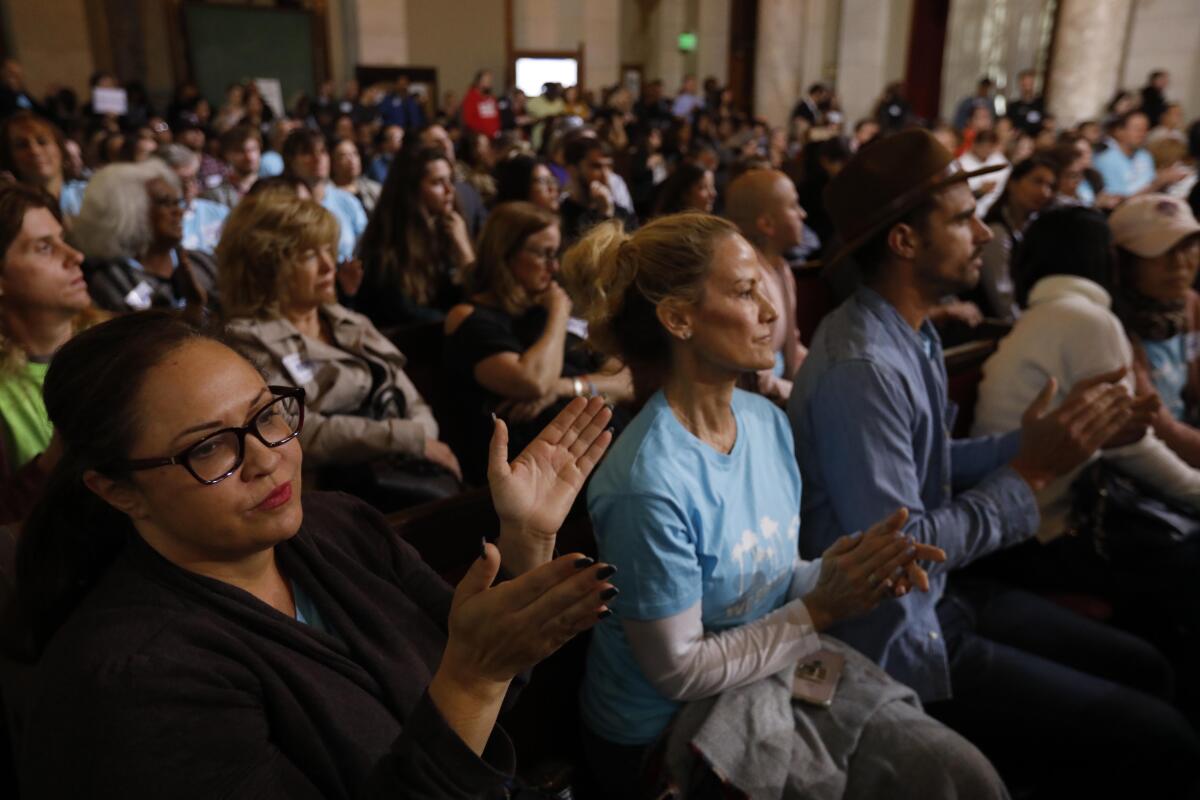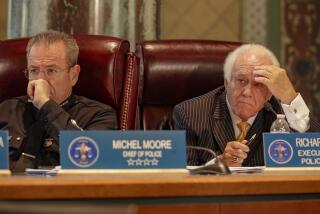Airbnb wants L.A. to delay enforcing new restrictions on short-term rentals

When the Los Angeles City Council unanimously voted in December to impose new rules on Airbnb and other online platforms that help people rent homes for short stays, tenant activists applauded the move, saying it was high time for the city to act.
The new ordinance, passed after more than three years of debate at City Hall, limits Angelenos to hosting short-term rentals in their “primary residence,” not in a second home or an investment property. The goal was to prevent apartments from being bought up and run like hotels — a phenomenon that activists complained was exacerbating the city’s housing crisis.
But the rules did not kick in right away. And now Airbnb is pushing the city to delay enforcing them more.
In a letter sent to city officials Friday by the company’s public policy manager John Choi, Airbnb argued it needs more time to build a computerized system to share rental information with the city — one of the ways that online platforms can comply with the new ordinance. So far, Los Angeles has held off on cracking down on Airbnb-type rentals, giving hosts until November to register with the city through a new system.
But the company says it did not get a draft of a key agreement from the city until late August, making it “impossible” to meet a November deadline. Airbnb also says it needs a city contractor to make more progress on the shared system — a process that could take months — before it can move forward.
On Monday, Airbnb added that it supports L.A.’s new registration system for its hosts, but “the city is asking platforms to comply with a system that does not yet exist and won’t exist” by this fall.
The L.A. ordinance requires platforms such as Airbnb and HomeAway to regularly hand over information about their bookings, a requirement meant to help the city enforce its rules about how often people can rent out homes for short stays.
Yeghig Keshishian, a spokesman for the city’s planning department, said that the computerized system was “one method” of compliance — and likely the most efficient one — but the companies “also can share with us a spreadsheet with the relevant information.”
Airbnb argued in its letter that it would be “an excessive burden” to comply with the city’s rules in another way while simultaneously building the computerized system.
Keshishian said that whether or not they reached an agreement with Airbnb, L.A. “will be prepared to enforce the ordinance come Nov. 1.”
HomeAway has also asked the city to postpone the November enforcement date, as it pushes the city to permit short-term rentals of properties other than a host’s primary residence. The idea has been backed by some council members, but L.A. has yet to draft such rules.
Critics of short-term rentals argue that delaying enforcement will only extend the abuses that led to the city enacting regulations in the first place, allowing corporate owners to keep operating apartments like “rogue hotels.” Implementing the rules, they said, would bring more housing back onto the market for ordinary tenants.
“The city has declared a state of emergency on homelessness — yet they’re dragging their feet on short-term rentals,” said Judith Goldman, one of the co-founders of Keep Neighborhoods First, which has raised concerns about how “commercialized” rentals affect housing availability.
Lynn S. Mohrfeld, president and CEO of the California Hotel & Lodging Assn., called it “ridiculous” that Airbnb would seek more time after the city had already provided a “grace period” after the ordinance went into effect in July.
“It’s tough to believe a technology company can’t comply with very simple data requirements,” said Mohrfeld, whose industry group faced off with Airbnb during the City Hall debate over rental regulations.
In its letter, Airbnb also complained that L.A. had failed to provide adequate information to hosts about how to follow the new rules, including how to get permission to exceed an annual cap and rent out their homes to travelers all year. Some hosts will soon reach the 120-day limit, “putting at risk a critical income stream for thousands of Angelenos,” it wrote.
Venice rental host Ed Colman, 67, said that if he can’t get permission to rent out his guest room for more than 120 days annually, it would be “a huge loss of income — to the point where I’m not sure I could continue living in Los Angeles.”
Colman said the city hasn’t been forthcoming about how to get that approval. “There are questions that it behooves the city to clarify before they start enforcing ... People don’t know what they need to do,” he said.
Planning officials said Monday that if any hosts had questions, the department was ready to help.
Airbnb also warned that a deal the company struck with the city to collect lodging taxes for its hosts could be in jeopardy. The agreement, which has been in effect for more than three years, is set to expire at the end of October. If it does, hosts would still be obligated to collect the taxes and pass them along to the city, but Airbnb, in its letter, said the deal “will lapse in the absence of” a broader agreement over the ordinance.
A spokesman for Mayor Eric Garcetti said his office was reviewing Airbnb’s request. Councilman Marqueece Harris-Dawson, who heads a committee focused on planning, had no immediate comment, according to his spokesman.
Councilman Paul Koretz, who has been critical of short-term rentals for pulling housing off the market, said it was hard for him to tell from Airbnb’s letter whether there was a legitimate need to delay enforcement. Even if there is, he argued, the city should press forward with tackling “the absolute clearest, most egregious violations” of the new rules, including hosting such rentals in rent-controlled units.
“If they’re not willing to do that, I think this is just an excuse,” Koretz said.
Even after the new ordinance was approved, Airbnb spent more than $190,000 from January through June to continue lobbying city leaders and staff, according to disclosures filed with the Ethics Commission. Hotel industry groups and other Airbnb critics also have continued to lobby the city, although their total spending is harder to calculate because some groups don’t report the amount they spent lobbying on each issue.
Airbnb, which has announced plans to go public, has also been a regular donor to L.A. city politicians and gave $25,000 this spring to sponsor the Obama Boulevard renaming ceremony at the request of Council President Herb Wesson, according to city disclosures.
More to Read
Sign up for Essential California
The most important California stories and recommendations in your inbox every morning.
You may occasionally receive promotional content from the Los Angeles Times.











